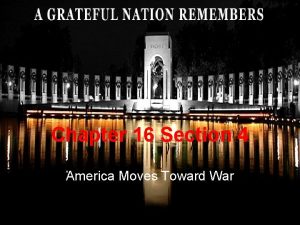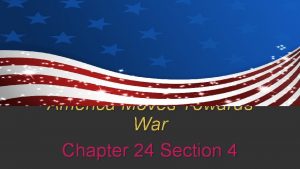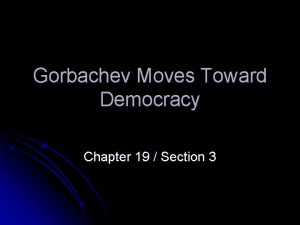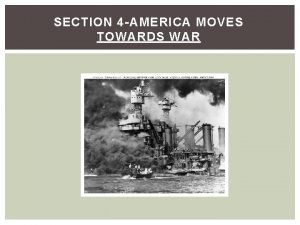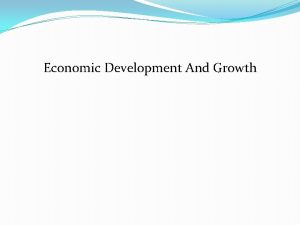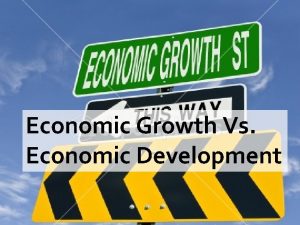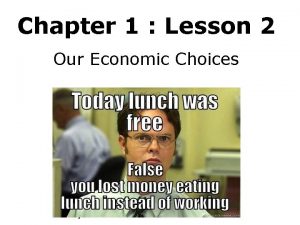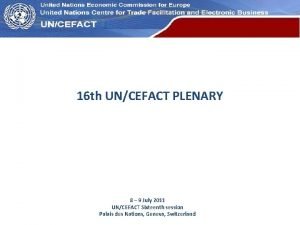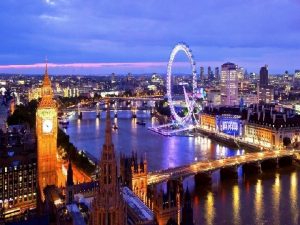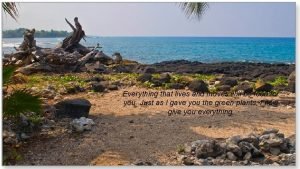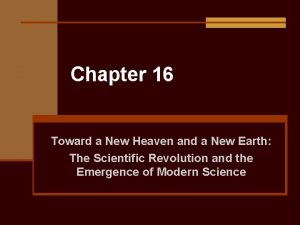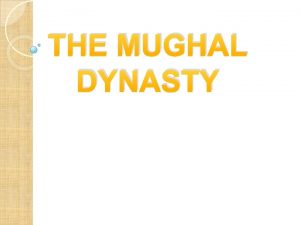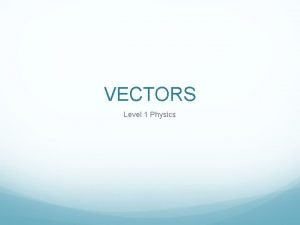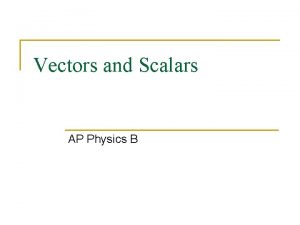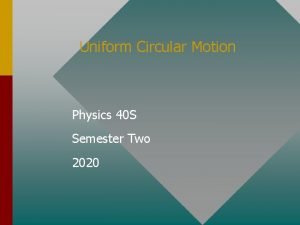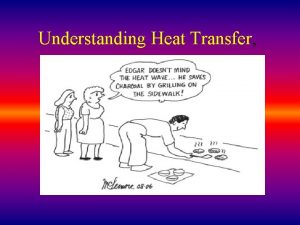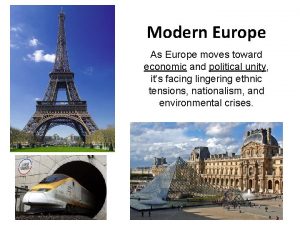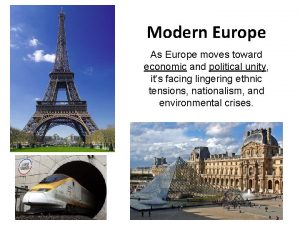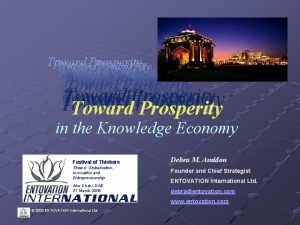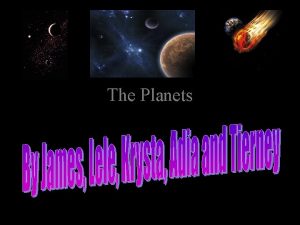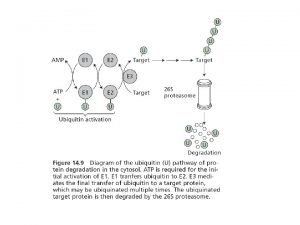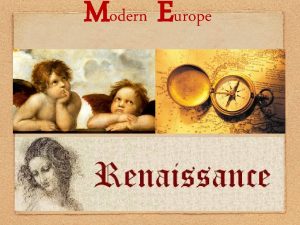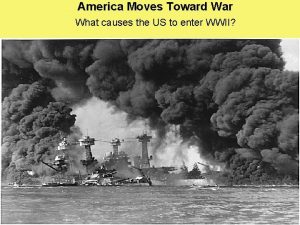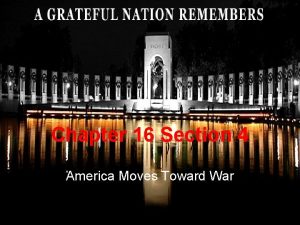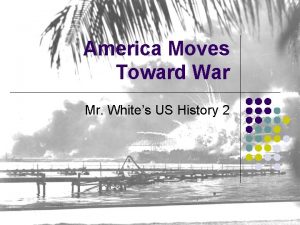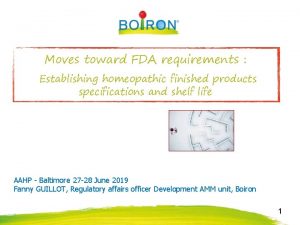Modern Europe As Europe moves toward economic and



















- Slides: 19

Modern Europe As Europe moves toward economic and political unity, it’s facing lingering ethnic tensions, nationalism, and environmental crises. 1

Turmoil in the Balkans • Yugoslavia was a nation of many ethnic groups distributed among six republics. List the 6 Republics

Roots of the Balkan Conflict • Serbs are predominantly Orthodox Christians • Croats are predominantly Catholic • Most Bosniaks and Albanians are Muslim 3

ØFear of Serbia • When Serbia tried to dominate Yugoslavia, other republics broke away. This sparked conflict. • Slovenia and Croatia declared independence, and the Serbian-led Yugoslav army invaded Slovenia and Croatia. • Slovenia quickly gained freedom in 1991. • Montenegro declared its independence in 2002 • Kosovo declared its independence in 2008 4

• War in Bosnia – Bosnia and Herzegovina declared independence in 1992. – Serbs wanted to get rid of Bosnian Muslims, and Croats. – Serbs used ethnic cleansing, or violent elimination of an ethnic group, to kill over 200, 000 people. – Over 2 million people fled the Balkans.

ØWar in Kosovo • Kosovo was inhabited by Muslim Albanians, and sought independence. • Kosovo Liberation Army (KLA) attacked Serbian officials. • Serbian government bombed the Albanians, launched an ethnic cleansing against them. • In 1999, NATO bombed Serbia in order to stop the violence. • Serbs soon withdrew troops from Kosovo. 6

An Uncertain Future • Croatia joined the European Union in 2013. • Bosnia & Herzegovina applied to join the EU. The application was accepted on 9/20/2016 Current map of the Balkans.

Europe’s Pollution Problem • Golden Poison – In 2000, a Romanian gold mine leaked cyanide into streams and the deadly poison flowed into Hungary’s Tisza River. – It killed 80% of the river’s fish, and almost all of the area’s fishing jobs were lost. 8

• Causes of Water Pollution – Not all cities have sewage treatment plants, so harmful substances can contaminate rivers, soil, and crops. – Rain washes the chemical fertilizers off fields and into waterways. – This causes algae and plants to grow faster than fish can eat them, when the algae and plants die the decay uses all the oxygen and also kills the fish. 9

• Cleaning up the Water – Cleaning up requires cooperation between nations. – The European Union passes environmental protection laws that it’s members must obey. 10

• Causes of Air Pollution – Industrial factories put chemicals like sulfur in the air. – Breathing polluted air contributes to respiratory diseases like asthma, bronchitis, and emphysema. – Air pollution harms livestock, stunts plant growth, and causes acid rain. 11

• Cleaning Up the Air – Individual countries passed laws to make air safer to breathe. – In 2013 the EU nations agreed to further reduce car emissions by 2020.

The European Union • After World War II (1939– 1945) European nations hoped to rebuild their economies and prevent new conflicts. • In 1951, France and Germany moved toward unification by signing a treaty giving control of their coal and steel to the multinational European Coal and Steel Community (ECSC). • Later, Italy and Benelux also joined the ECSC. 13

• The European Economic Community (EEC) or Common Market formed in 1957. • The EEC removed trade barriers, and set common economic goals. • People could live and work in any of the member countries. • In 1993 the Maastricht Treaty replaces EC with European Union (EU) • There were 15 member nations. 14

The European Union Today • EU members use a common euro currency and some fear that this causes a loss of individual national identities. – There is no national currency picturing national heroes. – Workers can easily move from an area with low income to one with higher wages. 15

• Others feel euro increases business efficiency, and international trade. • Financial institutions began calculating transactions in euros in 1999. • Euros have been used in everyday life since 2002. 16

Expanding the EU • EU currently has 28 countries, and 508 million people. • It can be hard to manage a huge alliance. • Great Britain voted in 2016 to leave the European Union. • The European Union is headquartered in Brussels, Belgium. 17

18

Bibliography • Mcdougal Littell, World Geography. Houghton Mifflin Company. 2012 19
 Chapter 16 section 4 america moves toward war
Chapter 16 section 4 america moves toward war Chapter 24 section 4 america moves toward war
Chapter 24 section 4 america moves toward war Gorbachev moves toward democracy
Gorbachev moves toward democracy America moves toward war section 4
America moves toward war section 4 Difference between economic growth and economic development
Difference between economic growth and economic development Economic growth vs economic development
Economic growth vs economic development Lesson 2 our economic choices
Lesson 2 our economic choices United nations economic commission for europe
United nations economic commission for europe Johann basedow the father of gymnastics
Johann basedow the father of gymnastics Dogs bark caravan moves on
Dogs bark caravan moves on Everything that lives and moves about will be food for you
Everything that lives and moves about will be food for you Legal moves algebra tiles
Legal moves algebra tiles Chapter 16 toward a new heaven and a new earth
Chapter 16 toward a new heaven and a new earth Chapter 16 lesson 2 challenges to slavery
Chapter 16 lesson 2 challenges to slavery Who was babur
Who was babur A storm system moves 5000 km due east
A storm system moves 5000 km due east A storm system moves 5000 km due east
A storm system moves 5000 km due east 700 calories scalar or vector
700 calories scalar or vector A skater moves with 15 m/s in a circle
A skater moves with 15 m/s in a circle Heat always moves
Heat always moves
